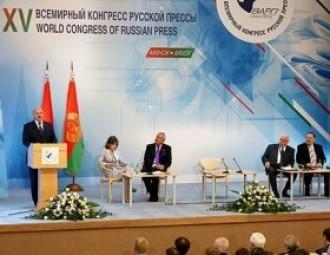Belarusian-Russian relations remain tense

Sharp criticism of the Russian authorities implies that tensions between Minsk and Moscow continue. Simultaneously, Belarus is playing fairly successfully in the Russian information-ideological field.
On June 20th, President Lukashenka spoke at the 15th World Congress of the Russian press plenary session, held in Minsk.
Lukashenka’s the most significant political statement was open criticism of the liberal market system, enacted in Russia in the 90s, which was still in place. In particular, Lukashenka said that unlike in Russia, “property was not stolen from the people” in Belarus and that “an economic system based on fraud is not sustainable”. Such statements are typical for the Belarusian president, but in this particular case, they were uttered in the presence of the leading Russian media managers and Russian politicians (for example, First Deputy Chairman of the Russia’s State Duma Alexander Zhukov).
Firstly, Lukashenka’s rhetoric suggests that the presidents of Belarus and Russia are still busy bargaining about economic issues (oil supply volumes to Belarus, privatization, trade preferences within the Customs Union, military and technical cooperation) without reaching a compromise. Allegedly, Lukashenka’s harsh statement was his reaction to a telephone conversation with Putin on June 19th
Secondly, Lukashenka’s statement should be regarded in a broader ideological contest. Belarusian authorities regularly invite Russian journalists to Belarus to demonstrate “the Belarusian Social-oriented economic model benefits” and actively criticize Russia’s liberal market system. Often Russian regional media journalists are invited to take part in such ‘press-tours’ however this time the authorities reached out to a new level and participated in the World Congress of Russian Press.
It should be noted that Vladimir Putin’s election campaign in 2012 was based on populist rhetoric. However he has not yet managed to fulfill his promises and attempts to force the government to follow his orders face an open opposition by the Russian elite. The situation creates favourable environment for the Belarusian authorities in the Russian information field to advertise Belarusian experience in economic policies management and strict control over political elites.
-
03.01
-
07.10
-
22.09
-
17.08
-
12.08
-
30.09








































